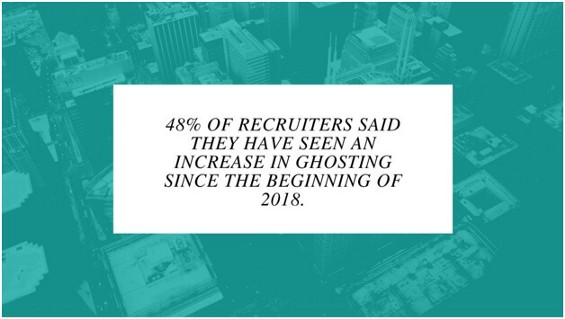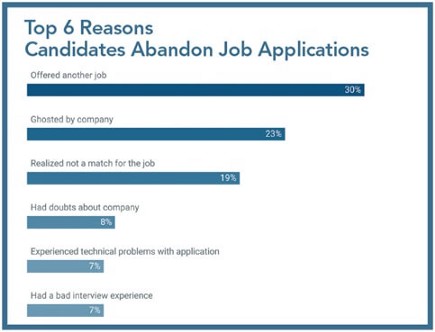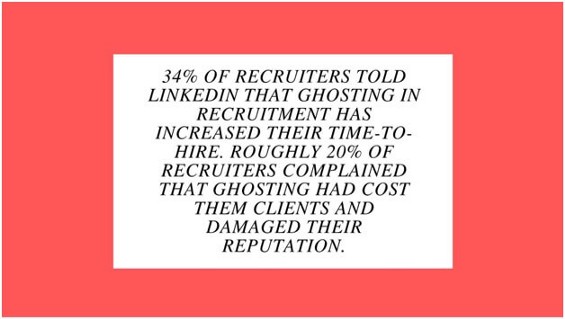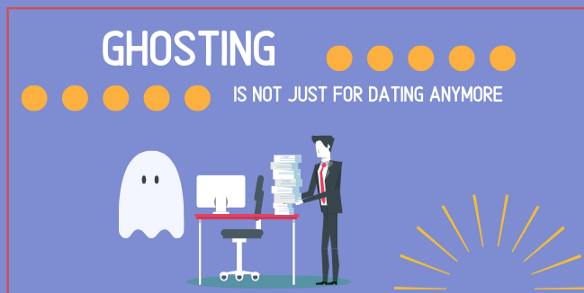Being ghosted while dating is a terrible thing any person can experience. If that wasn’t enough, now ghosting is slowly creeping into the workplace as well.
Imagine this scenario. You find a candidate who aced multiple interviews. So, you decide to call them with an offer. However, your calls and texts go unreturned. You check your email, see if they called, but nothing. Then you start to worry: Was there a family emergency? An illness? Car accident? Two weeks pass, and you still don’t hear a word from the candidate.
This phenomenon is called “ghosting.” In dating, the term is known to be the act of disappearing without notice. Well, it seems like ghosting is becoming a more prominent occurrence in the workplace too. When Linkedin polled 600 recruiters, 48% of them said they have seen an increase in ghosting since the beginning of 2018.
As a result, employment recruiters feel pressured to find strategies for dealing with the sudden disappearance of talent.


Why are candidates disappearing?
No, they have not been kidnapped by aliens.
So why are candidates choosing to disappear instead of taking the high road and informing you of their decision?
One of the main reasons is perhaps due to inexperience in the workplace. Or, they might want to avoid an awkward conversation with a manager. So, candidates leave and never come back.
There might be other factors at play. Candidates might have a range of job offers, and another company got their attention. The job you’re offering isn’t up to their standards. They have the freedom to choose, so they choose to ignore you.
In fact, in 2018, there were 7 million open jobs in the U.S., but only 6.3 million unemployed people were looking for a job. There are more open jobs than there are unemployed workers. Having multiple opportunities up their sleeve, people get to say no to your job.
Some people don’t blame candidates for going cold. Employers are the ones who were notorious for not getting back to candidates. Feeling upset from years of applying to jobs only to get a rejection back, candidates don’t feel ashamed to disappear.
Additional Reading: Why Transferable Skills are Important for Recruiting Top Talent


How does ghosting affect employment agencies?
The rising trend of ghosting is not only present in engineering or in finance. It’s present in areas ranging from healthcare to food service.
This behavior that used to be only associated with online dating, it’s now negatively affecting recruitment. Employment agencies report that the practice is prolonging hiring, forcing them to stop their recruitment processes.
Recruiters find themselves under a lot of pressure. They have seen all kinds of ghosting scenarios:
- A candidate agrees to a job interview but then fails to show up.
- A candidate accepts the job offer but then doesn’t arrive on their first day of work.
- An individual accepts a job and then fails to show up for onboarding.
- A candidate calling six weeks after only to say they have accepted another job.
Faced with ghosting by candidates, recruitment agencies are forced to begin the hiring process anew. This can be time-consuming and costly.
Moreover, 34% of employment recruiters told LinkedIn ghosting in recruitment has increased their time-to-hire. Nearly 24% of them reported that they call a new hire on their first day of the job to make sure they’re coming. Roughly 20% of recruiters complained that ghosting had cost them clients and damaged their reputation.
Additional Reading: Hiring for Startups? These Are the 7 Best Job Posting Sites to Use


What Can HR Managers and Employment Agencies Do?
Have a database of candidates who disappeared
Every time a candidate goes “Casper” on you, make sure you add them to your database. Having a database with “ghosts” is a wise idea. By doing this, your staffing agency will know if the same applicant who ghosted returns in a few months or even in a year. You’ll know that that person must be eliminated from the recruitment process. Make sure your employment agency stores these details so you can prevent that scenario from happening.
Treat candidates politely
Poor treatment of your candidates will result in them leaving your talent pipeline, unlikely to ever return again. You can’t have them come in for three rounds of interviews and then never get in touch with them again. If you treat them poorly, they’ll treat you poorly in return. What’s more, they might tell their friends or other employees about what you’ve done. To avoid this, make sure you always treat your candidates with respect and communicate with those who have interviewed. Instead of sending them automated messages from your ATS, make time to send them personalized texts, or even call to inform them of your decision. You’ll give your recruitment agency’s reputation a boost, improve your talent pipeline, and receive more referrals from current employees.
Overbook interviews
Many employment agencies have begun overbooking interviews with candidates. They know that 50% of them won’t show up. If you fear that you’ll be ghosted by many candidates, schedule more interviews to avoid uncomfortable scenarios. For example, if you’re hiring for two job positions, set up 10 interviews. If all 10 people come to the interview, then that’s a bonus. Keep interviewing people, keep talking to them, and keep working on maintaining your talent pipeline. If one person ghosts, you’ve got backups.
Shorten the hiring process
Another reason why candidates are disappearing might be due to your lengthy hiring process. If choosing a candidate takes too long, you might want to shorten the process. Try reducing the number of interviews and provide feedback to candidates throughout the hiring process. Check-in with them frequently to inform them that the process is still ongoing. You don’t want people to lose hope and accept a job with another employer. If you don’t check in with your candidates after an interview, the chances of you being ghosted are higher.
Integrate them into the company as soon as possible
Another strategy your employment agency can adopt is to start integrating candidates into their new company as soon as they sign the offer. Introduce them to their manager and their coworkers. Make them feel like a part of the team and start with their formal onboarding. If they develop a relationship with their new company and team, they won’t listen to another recruitment agency.
Additional Reading: The Devastating State of Maternity Leave in the U.S.
Key Takeaways
At the end of the day, it all comes down to treating people with respect and professionalism. Only by offering a positive candidate experience will your employment agency have higher chances of a smooth and successful recruitment process. Follow the tips mentioned above to attract top talent and ensure they won’t vanish on the first day of the job.









